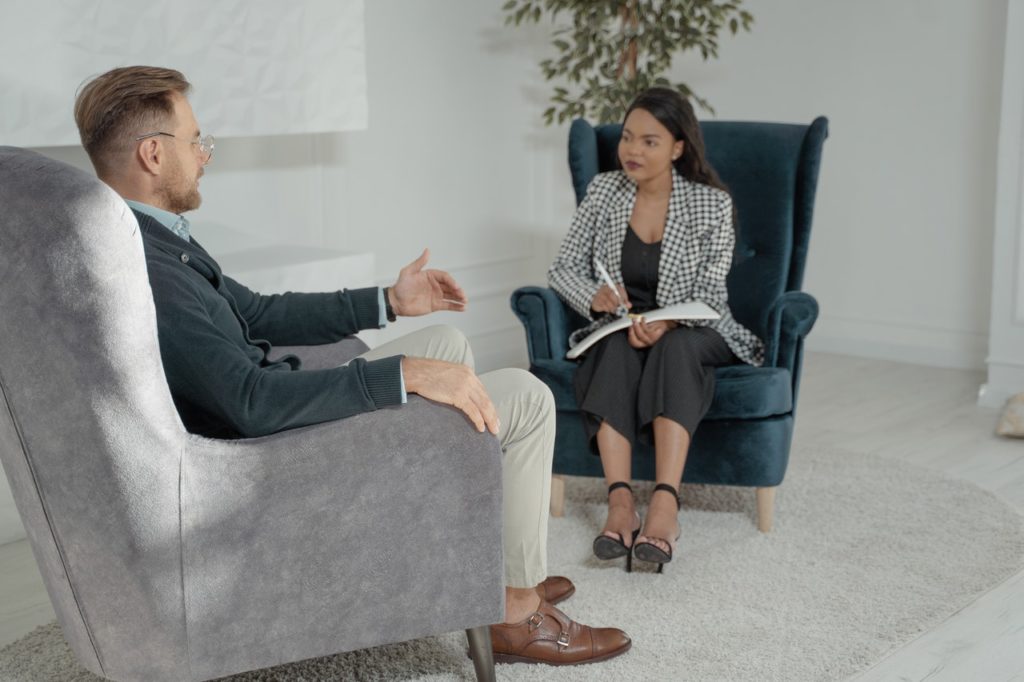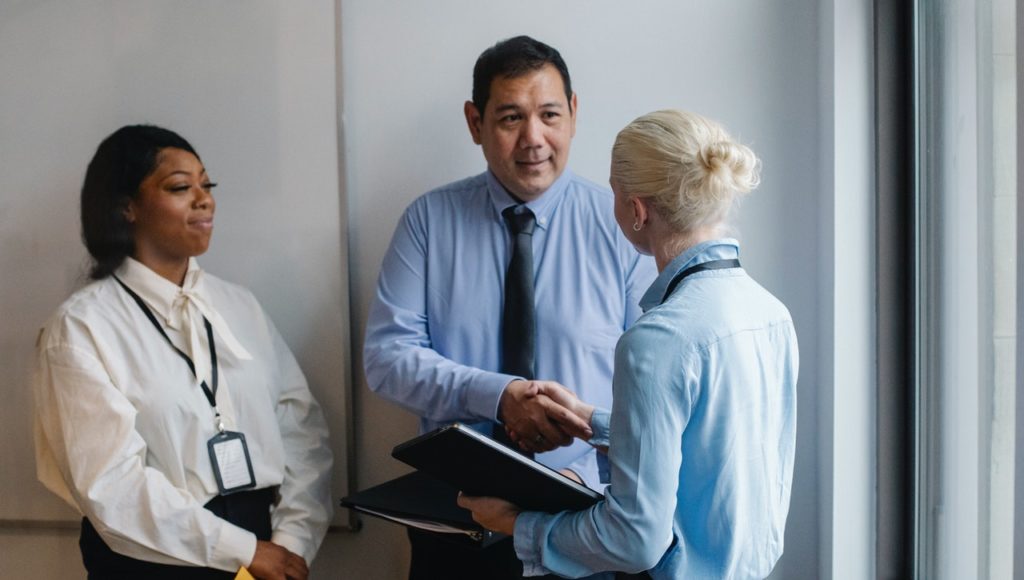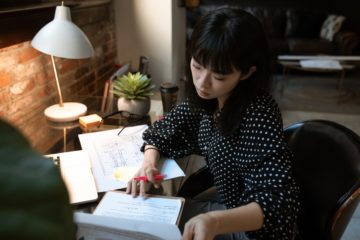Interview Body Language is a form of Non-verbal communication that accounts for over 90% of the message conveyed in a job interview. It is essential to display the right interview body language to leave positive impressions in the mind of Recruiters.
Interview Body Language involves interview posture, hand gestures, eye contact, voice tone as well as facial expressions or reactions.
Below, we have some Expert Tips for Interview Body Language:
#Interview Posture: How to sit for an interview?
Dos:
- If you’re offered a seat, sit slowly without making any noise.
- If various chairs are present, gently pull the nearest one forward and try to sit on wooden chairs instead of rocking or rotating ones.
- Cross your feet at ankles or place them flat on the floor to look confident and professional during the interview.
- Sit upright. It indicates that you are comfortable and confident.
- Be calm, lean slightly forward, about 10° towards the interviewer. It conveys that you are engaged and involved in the conversation.
- Tilt your head slightly to one side to appear friendly and interested.
- Slightly nod your head in response to what the Interviewer says.

Don’ts:
- Don’t annoy the Interviewer by creating weird, horrible noises while sitting down.
- Avoid fiddling with chairs or selecting which chair to sit. Most often, interviewers offer you a chair but don’t ask for one if it isn’t there.
- Don’t cross your legs or place them above the knees, it appears defensive and unwelcoming.
- Avoid hunching down or bending in front of the Interviewer. It gives the impression that you’re nervous with low self-esteem.
- Don’t be too relaxed or sloppy as it indicates a careless attitude and lack of energy.
- Sitting or leaning on the edge of a chair comes off as being nervous and tense.
- Leaning back on the chair makes you appear too casual and uncomfortable with the interview.
- Practice sitting comfortably, avoid foot tapping or shaking legs during interviews.
- Don’t keep your head straight the entire time otherwise you’ll be marked as authoritative and unsocial.
- Avoid shaking your head or twirling your hair by habit, it is extremely distracting.
#Hand Gestures: How to use hands during Interviews?
Dos:
- If you’re unsure of how to use your hands, rest them loosely clasped in your lap or on the table near you.
- If it’s a virtual interview, avoid extending your arms near the camera to prevent blocking the view.
- Control your hand gestures and be aware of the messages you’re sending with them.
- Try to place your arms and hands comfortably both while sitting on the chair or on the table.
- Move your hands and arms less to appear confident and reduce palpitation during interviews.
- If you’re taking notes, drop your pen when you’re done.
- Keep both hands away from your face. Touching the nose or lips indicates that you’re lying or uncertain.
- Extend a warm handshake when the interviewer offers, be firm but not very rigid or clumsy.
Don’ts:
- Don’t threaten the Interviewer, stop pointing fingers or making fists.
- Avoid obscene gestures, such as showing your index or middle finger.
- Don’t ever pick your nose or chew nails in an interview.
- Don’t stretch or keep your hands behind the neck or else you will look lethargic and indolent.
- Stop fiddling with your face and hair, it’s unprofessional and conveys nervousness or anxiety.
- Don’t fold your arms together across your chest as it suggests a defensive attitude.
- Completely refrain from clapping, twisting knuckles or banging the table or desk near you.
- Don’t fold napkins or handkerchiefs on wrists to look stylish.
- Don’t wear any kinds of gloves or hand warmers during interviews.
- Avoid keeping the pen in your hand all the time unless you’re taking notes.
- Don’t get up to shake hands with the Interviewer unless they offer.
- Don’t wave your hands or arms. It’s very unprofessional.
#Eye Contact: How to build rapport through Eye Contact?
Dos:
- When the interviewer speaks, show you’re actively listening by maintaining direct eye contact.
- Hold eye contact for about 10 seconds and briefly look away before re-establishing eye contact.
- If you’re listening, maintain eye contact a little longer to show that you are attentive.
- When you’re speaking or you’re asked something, raise your head and make constant eye contact to retain the attention of Interviewers.
- During Panel Interviews, look at and direct your answer to who asked the question and glance periodically at others.
- Good eye contact helps to maintain rapport with the interviewer.
- Looking constantly downwards is considered insincere and submissive. Look down while making notes or referring to something.
- If you use specs, clean them to remove dirt and debris that might hinder eye-contact.
- Look interested, engaged and motivated from within so that it also resonates from your eyes.
Don’ts:
- Avoid staring aggressively or ogling by blinking at regular intervals or nodding your head.
- Don’t overuse eye contact or you can appear as challenging to the interviewer.
- Do not blink often when the interviewer is looking at you.
- Do not look down when the interviewer is speaking to you, it creates a negative impression.
- If the interviewer avoids eye contact then don’t try to initiate forcibly.
- Don’t squinch your eyes or eyebrows or you will appear irritated and arrogant.
- Don’t be mesmerised by the interviewer’s eyes and don’t make them uncomfortable.
- Avoid rubbing or squeezing eyes in front of the interviewer.
- Do not look or stare here and there during the interview.
- Don’t wear sunglasses or eyewear that conceals your eyes.
- Avoid looking clumsy, sleepy or exhausted. Wash your eyes to feel fresh.
#Facial Expressions: How to react during interviews?
Dos:
- Practice emotional control and rehearse before the interview.
- Make a conscious effort to smile while greeting the interviewer. It helps build rapport and boost confidence.
- Ensure the smile appears genuine and appropriate. It’s better to smile with the lips closed than by showing teeth.
- Show warmth, enthusiasm and gratitude to attend the interview.
- Try to appear sublime, humble and prepared for the interview.
- Retain your calm and have patience throughout the interview.
Don’ts:
- Avoid excess emotions such as laughing, crying or sobbing during interviews.
- Don’t appear annoyed or anxious even if you face Interview anxiety.
- Don’t look tender, pale or depressed from your facial expressions.
- Don’t start panting or be scared if you feel uncomfortable. Take a few deep breaths, pause and revive yourself.
- Don’t appear stoic or emotionally dry from facial expressions.
- Avoid frowning or pursing lips as it can be interpreted as annoyance or disapproval.
- Avoid grinning teeth, acting out of emotion or losing your composure.
- Don’t appear tempted or too jovial during the interview.
- Don’t appear frustrated or bored by your facial expressions.
- Don’t be distracted by interferences or disturbances during interviews.
#Voice Tone: How to monitor voice delivery?
Dos:
- Speak in a clear and controlled voice that expresses confidence.
- Breathe and pause for a while before answering a question, it gives time to react and prevents you from interrupting the interviewer.
- Interact with the interviewer as an equal and not a subordinate. Keep a voice tone that is not apologetic or defensive.
- Vary your tone and pitch according to the pace of the interview.
- If you feel like coughing, excuse yourself and cover your mouth with a napkin or handkerchief.
- Clear your voice and hydrate yourself to speak clearly before entering the interview room.
- Try to be immune from cold and cough before the interview.
Don’ts:
- Avoid speaking in monotones and don’t come across as overly excited or emotional.
- Don’t speak very slowly or too fast during interviews.
- Don’t start coughing severely, forgetting basic manners and hygiene.
- Don’t modulate your natural voice to impress the Interviewer.
- Don’t use accents unless you speak freely otherwise you’ll sound weird.
- Avoid belching or burping during interviews and excuse yourself if it happens.
- Never use slangs, slur or vulgar expressions during interviews.
#Bonus: How to read the interviewer’s body language?
- Take cues from the interviewer’s body language to understand how comfortable they are in your presence.
- Pay attention and mirror the Interviewer’s posture. Don’t be informal until you get a similar response from them.
- If the interviewer sounds bored, understand if you’re responding properly.
- If the interviewer appears uncomfortable, check yourself. Don’t invade their personal space, keep a distance of two to three feet if there is no table or desk in-between.
- If the interviewer wraps up the discussion earlier, you can ask them something like: “Is there anything else you wish to know from me?”
Conclusion:
Displaying the correct Interview Body Language isn’t a thing that can be done overnight.
It takes a lot of practice, time and effort to master them but most employers are considerate towards applicants who face interviews for the first time.
We hope our article ‘Interview 101: Interview Body Language’ will empower you to prepare and feel confident for interviews. You may use the cvDragon app, to assess yourself using mock interview questions, interview preparation tips, guides and much more!






